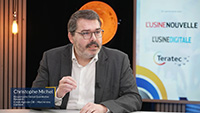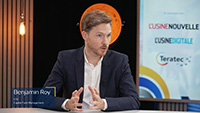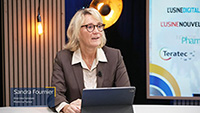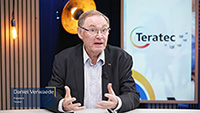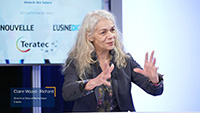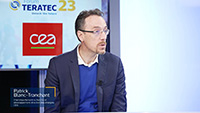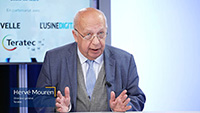|
|
> > Workshops

The European meeting for Experts in High Power Digital
Simulation . HPC/HPDA . Artificial Intelligence . Quantum Computing
|
 Digital Thematic Mornings Digital Thematic Mornings 
|
In addition to the exhibition and face-to-face conferences on May 21 and 22, 2025 at the Parc Floral de Paris, and its digital platform enabling the entire high-powered digital community to exchange ideas all year round, the Teratec Forum is offering themed Digital Morning sessions in April and October 2025.
A panorama, keynotes and a round-table discussion will feature contributions from industrial users and technology companies. Research projects will present their progress and innovative aspects. |
 Matinale 100% Digitale - December 11, 9:30 to 11:30 a.m. Matinale 100% Digitale - December 11, 9:30 to 11:30 a.m.
 Supercomputing applied to the fields of aeronautics and space Supercomputing applied to the fields of aeronautics and space
|
The aerospace sector is a major sector for our economy, for the development of the most advanced technologies, and for our sovereignty. The morning session will address the contributions of HPC and AI technologies in this sector. These technologies play a major role in design, production, operation, and maintenance. Particular emphasis will be placed on the central role of data through various applications: digital simulation for design, AI and predictive maintenance, and the use of satellite data. A round table discussion on data issues will highlight the challenges in terms of security and sovereignty. Finally, a research project will illustrate how quantum computing could open up new perspectives, particularly for increasingly complex simulations.
|

Bruno Stoufflet, President, Air and Space Academy, member of the Academy of Technologies, and former CTO of Dassault Aviation
|

Aurélie Raymond, Business Partner - Data, Operations Research & AI for E&M, Crew and Multirisks, Air France KLM
|

Bertrand Ounanian , Systemes Engineering Manager, Vast Data
|
 Roundtable : Roundtable :
Moderated by Emmanuel Duteil, Editorial Director, InfoproDigital Industry Division, L'Usine Nouvelle with the participation of Marcia Rodrigues Lopes, Director, Data Protection services portfolio and Strategic Alliances, Thales, Laurent Gicquel, Senior Researcher, CERFACS and Philippe Charpentier, Directeur Solutions Engineering, Netapp
|

Mérédith Martinez, Military Aerospace Government & Research, Intel
|

Anton Merlina, Head of the Computation Unit, CNES
|

Marta Reina, Quantum Application and Algorithm Scientist, Quandela
|
 Conclusion : Conclusion :
Christian Saguez, Président d'honneur et co-fondateur, Teratec
|
Registration >>>>
|
|
 Matinale 100% Digitale - April 29, 9:30 to 11:30 a.m. Matinale 100% Digitale - April 29, 9:30 to 11:30 a.m.
 IA Factory infrastructures and data: strategies for European leadership IA Factory infrastructures and data: strategies for European leadership
|
This Matinale Digitale explored the conditions necessary for the emergence of European sovereignty in Artificial Intelligence. It presented an overview of the European program and keynotes on modular architectures and data platforms. A round table brought together experts to discuss competitive infrastructures on a global scale. A research session examined the role of EFTs in innovation. The morning concluded with a review and outlook for Europe. |

Agatta Hidalgo, European Affairs Lead, France Digitale
|

François Sabatino, President, Eclairion
|

Bertrand Ounanian , Systemes Engineering Manager, Vast Data
|
 Roundtable: Roundtable:
Moderated by Emmanuel Duteil, Editorial Director, InfoproDigital Industry Division, L'Usine Nouvelle
With the participation of:
Patrick Lastennet, VP business Develomment & Strategic Partnerships, Opcore
José Noudohouenou, Senior Staff Ingenieur, AMD
Kacem Lounissi, Head of Data, AI & ML Ops, Sesterce
Laurent Thiers, Vice-président, DDN Storage
|

Rod Evans, Vice president Supercomputing, NVidia
|

Guillaume Bernard, IT Research Engineer, LNE (Laboratoire National de Métrologie et d’Essais)
|
 Conclusion : Conclusion :
Christian Saguez, Président d'honneur et co-fondateur, Teratec
|
| Replay Matinale IA Factory infrastructures and data >>>> |
|
|
 Matinale 100% Digitale - April 8, 9:30 to 11:30 a.m. Matinale 100% Digitale - April 8, 9:30 to 11:30 a.m.
 HPC and AI for new materials and new molecules HPC and AI for new materials and new molecules
|
This Matinale highlighted the key role played by materials in a wide range of fields, including energy, construction and health, while also emphasizing their impact on other sectors such as transport, chemicals and cosmetics. It covered the entire life cycle of materials, from design to recycling.
Data plays an increasingly important role at every stage, thanks in particular to learning and modeling tools. The alliance between artificial intelligence and digital simulation is opening up new perspectives in materials design and monitoring. Mastering algorithms and software is becoming a strategic challenge for competitiveness and sovereignty. Research and the dissemination of digital tools are essential to support this evolution. Last but not least, training in digital skills is essential to ensure that these technologies are used effectively and in an accessible way. |
Replay Matinale HPC and AI for new materials >>>> |
 Panorama : Panorama :
Pr Guillaume Maurin, Institut Charles Gerhardt Montpellier
|

Cécile Pereira, Program manager / AI Research Scientist, Total Énergies
|
 Roudtable: Roudtable:
Animated by Sylvie Latieule, Directrice de rédactions, InfoChimie, Industrie Pharma, with the particiption of:
Simona Bottani, Data Science Project Leader, Saint-Gobain
Thierry Deutsch, Head of MEM Laboratory, CEA
Christophe Domain, Engineer, EDF R&D
|

Edern Menou, Research Engineer in Data Science & Metallurgy, Safran
|

Mario Maglione, Directeur de programme, CNRS / ICMCB et Frédéric Schuster, Directeur de programme, CEA
|

Johann Rannou, Research Engineer in computational mechanics, Onera, Ramzi Messahel, Research Engineer, Safran Tech and Aubin Geoffre, Ingénieur de recherche en mécanique numérique, Ecole des Mines
|
 Key points and outlook Key points and outlook
Christian Saguez, Président d'honneur et co-fondateur, Teratec
|
Replay Matinale HPC and AI for new materials >>>> |
|
|
Replay the Teratec 2024 Forum Digital Morning sessions
 Trends and uses of generative AI in research and industry Trends and uses of generative AI in research and industry
-
Generative AI, research and industry: realities and potential
By Caroline Chopinaud, directrice générale, Hub France IA
-
Artificial Intelligence calls for new hosting infrastructures
By François Sabatino, président, Eclairion
-
Generative AI: a new digital Esperanto?
By Xavier Vigouroux, Head of Business Development HPCCS, Viridien
-
Roudtable: How far have manufacturers got in implementing generative AI systems?
Animated by Julien Bergounhoux, rédacteur en chef de l’Usine Digitale with the participation of Daniel Glazman (CTO Software, VP rattaché à la direction technique Groupe et en charge de la Recherche, des Technologies et des Innovations pour le Logiciel, Thales), Philippe Crespin (CEO, Spix Industry), Ilda Metani (Head of Industry AI Consulting, Schneider Electric) and Guillaume Trainar (sales director for Southern Europe, Rescale)
-
Generative AI to help us understand the Universe
By François Lanusse, chercheur au CNRS au sein du département d'astrophysique du CEA Paris-Saclay, et chercheur associé à l'Institut Flatiron
-
Generative AI to discover new materials for the chemical industry
By Victor Schmidt, CTO, Entalpic
-
Key points and outlook
By Daniel Verwaerde, Président, Teratec
Replay >>>>
 AI and digital twins: undeniable assets for resilient, sustainable cities AI and digital twins: undeniable assets for resilient, sustainable cities
-
AI and digital twins: between technological promise and major urban challenges
By Professeur Dominique Baillargeat, Director of CNRS office in ASEAN
-
Paris 2024 Olympic Games: how to make the ring road more fluid and maximize the thermal insulation of the Olympic Village
By Jacques Beltran, Vice President, Global Head, Cities & Public Services, Dassault Systèmes
-
How a computing infrastructure can serve the digital twin
By François Sabatino, President, Eclairion
-
Round Table: IA, AI, Digital Twins and urban transition, the importance of a multiscalar approach
Animated by Guillaume Doyen, Editorial Director (La Gazette des communes, Le Courrier des maires...) Infopro Digital with the participation of Philippe Sajhau (Director of smart cities, innovation and data, ville de Noisy-le-Grand), Benoit Gufflet (Innovation project manager, Groupe Bouygues), Philippe Chevalier (General Manager and co-founder, Kipsum) et Dimitri Sarafinof (Deputy Director of Programs and Chief Strategy Officer, IGN).
-
Presentation of the JUNON program: Centre Val de Loire Digital Twins for better management of local natural resources
By Sebastien Dupraz, Director of the JUNON Program, BRGM
-
Presentation of the DesCartes program on hybrid artificial intelligence
By Francisco Chinesta, University professor in digital physics, Ecole Nationale Supérieure des Arts et Métiers
-
Key points and outlook
By Christian Saguez, Co-founder and Honorary Chairman, Teratec
Replay >>>>
|
|
Replay the Teratec 2023 Forum Digital Morning sessions >>>> >>>>
 How AI and HPC are revolutionizing the insurance and finance industry How AI and HPC are revolutionizing the insurance and finance industry
-
Panorama with Christophe Michel, Responsable Global Quantitative Research , Crédit Agricole CIB - Marché des capitaux
-
Round Table: Finance-Insurance-Risk Modeling: The response of the great computing powers of AI animated by Emmanuel Duteil, Directeur des Rédactions du pole industrie d’Infopro Digital, with the participation of Emmanuel Gobet (Professeur de Mathématiques Appliqués, Ecole Polytechnique), Christophe Blanchet (Data Analytics - BFSI, Altair), Vincent Gibert (Regional Sales Manager SEUR, VAST Data), Tjerk Houweling (Consultant AI solution architecte, HPE)
-
Keynote with Benjamin Roy, CTO, Capital Fund Management
-
Research & Development Session with Victor Le Coz (Researcher in Econophysics, Ecole Polytechnique ) and Charles-Albert Lehalle (Quantitative R&D Lead, Abu Dhabi Investment Authority)
-
key points and perspectives
by Christian Saguez, Président d'honneur et co-fondateur, Teratec
Replay >>>>
 The extraordinary contribution of digital technology to healthcare The extraordinary contribution of digital technology to healthcare
-
Opening with Claude Bertrand, VP exécutif en charge de la R&D, Servier
-
Keynote with Sandra Fournier, Directrice générale, Moderna France
-
Round Table: Numerical modeling tools: what can they do for the healthcare sector? animated by Sylvie Latieule (Directrice des rédactions InfoChimie, Industrie Pharma) with the participation of Christophe Battail, (Chercheur en Bioinformatique, Directeur adjoint du laboratoire Gen&Chem, Institut IRIG, CEA Grenoble), Michel Behr (Directeur Adjoint du TS2, LBA - Université Gustave Eiffel /Aix-Marseille Université), Mehdi Rahim (R&D Scientist - Computational and Data Science research team, Air Liquide), Irène Vignon-Clementel (Directrice de Recherche, Inria Simbiotix and an Owkin representative
-
Keynote with Loic Delannoy (Regional Sales Manager, VAST Data) and Alban Lermine (Directeur SI et Bioinformatique GCS SeqOIA)
-
Keynote with Mathieu Charvériat, Co-Fondateur et Directeur Général, Theranexus
-
Research and Development session with Jean-Baptiste Morlot (Co-Fondateur et CTO, DeepLife), Wilfried Kirschenmann (Directeur R&D et CTO, Aneo) and Bruno Lecointe (Group VP Business Support HPC AI & Quantum, Eviden an atos business)
-
key points and perspectives by Daniel Verwaerde, Président, Teratec
Replay >>>>
 Digital energy: developments and challenges Digital energy: developments and challenges
-
Introduction & Overwiew with Claire Waast-Richard, Data Manager, Enedis interviewed by Emmanuel Duteil, Director of the Industry section of Infopro Digital
-
Keynote with Patrick Blanc-Tranchant, Head of Research and Development Department, CEA Energy Directorate
-
Round Table: Digital in future energy systems animated by Julien Bergounhoux Rédacteur en chef L'Usine Digitale with the participation of Eric Andersen, Senior GM-Head of Geoscience Solutions, Petronas), Muthukumar Sockalingam (Project Manager, Petronas Digital), Chin Soon Lim (Application Support Engineer, Petronas ICT), Victor Martin (head of R&D, Totalenergies), Jean-Thomas Acquaviva, (Team lead research groupe, DDN), Emmanuel Besse (CEO Worldgrid, Head of E&U Industry Southern Europe, EVIDEN)
-
Keynote with François Sabatino, Président de Eclairion
-
Research and Development Session with Joseph Mikael (Head of Quantum Computation & Quantum Information project, EDF), Mathieu Salanne (directeur ISCD - Institut des sciences du calcul et des données Sorbonne Université), Michaël Gabay (Directeur, Artelys) and Helen Schottenhamml (Doctoral Researcher, IFPEN)
-
key points and perspectives by Hervé Mouren, Managing Director, Teratec
Replay >>>>
|
|
For any other information regarding Digital Thematic Mornings, please contact:
Jean-Pascal JEGU
Tel.: +33 (0)9 70 65 02 10
jean-pascal.jegu@teratec.fr
Campus TERATEC
2, rue de la Piquetterie
91680 BRUYERES-LE-CHATEL
France
|
|

